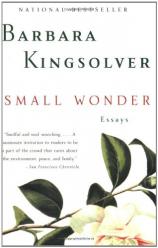Reading Group Guide
Discussion Questions
Small Wonder: Essays

1. Kingsolver opens her collection with a story out of Iran. A young child wandered away from his home and was found, some distance away, in a cave where he was sleeping safely in the embrace of a female bear. She uses this remarkable example of maternal nurturing to demonstrate that there is good in every living being, and that we share more than we realize with those whom we presume to be our enemies. Can you, like Kingsolver, make the connection between the bear and your own private or public enemies? What does it take to understand, and act on, the idea that "our greatest dread may be our salvation"?
2. Citing our nation's incredible wealth compared to most countries around the globe, Kingsolver writes, "For most of my life I've felt embarrassed by a facet of our national character that I would have to call prideful wastefulness. What other name can there be for our noisy, celebratory appetite for unnecessary things, and our vast carelessness regarding their manufacture and disposal?" Do you share her embarrassment? Why or why not?
3. How would you answer her question, "How much do we need to feel blessed, sated, and permanently safe? What is safety in this world, and on what broad stones is that house built?" Do you live with much more than you need? A little more? Not enough?
4. Woven into these essays are a number of subtle challenges Kingsolver poses to her readers. She talks, for instance, of all the things her daughter does instead of watching television, and then comes to the conclusion that there just isn't enough time in the day to watch it. Likewise, she writes of limiting herself to one national newspaper a week, usually the Sunday edition. This, she says, along with the town newspaper, provides her with all the information she needs to be a responsible citizen. Does this make sense to you? Are you on a "media diet"? If not, how would it effect your life if you were?
5. In another essay Kingsolver writes of ways to "think globally and act locally." For instance, contributing $10 a month to support locally grown and produced food; only eating chicken and meat that have been grass-fed and buying only organically grown vegetables; attempting to feed her family on food that originated no more than an hour's drive from her house. If you are not already, is it possible for you to take on any or all of these practices? What would be the cost in time and dollars to do this? What would be the benefit to you, your family, and the world?
6. How do you respond to Kingsolver's criticism of America entering into a full-scale war against terrorism? Do you agree with her comment that "Our whole campaign against the Taliban, Afghan women's oppression, and Osama bin Laden was undertaken without nearly enough public mention of our government's previous involvement with this wretched triumvirate, in service of a profitable would-be pipeline from the gas fields of Turkmenistan"? Does this response to our actions in Afghanistan strike you as unpatriotic? How do you define patriotism?
7. Of the shootings at Columbine High School, Kingsolver writes "Some accidents and tragedies and bizarre twists of fate are truly senseless, as random as lighting bolts out of the blue. But this one . . . was not, and to say it was is irresponsible. 'Senseless' sounds like 'without cause,' and it requires no action so that after an appropriate interval of dismayed hand-wringing, we can go back to business as usual. What takes guts is to own u p: this event made sense." Do you agree that, in the environment in which our children are raised, these killings made sense? Do you agree with her calling for a zero-tolerance for murder as a solution to anything? How would such an approach help address the recent terrorist attacks?
8. In "God's Wife's Measuring Spoons" Kingsolver makes the point that since the War on Terrorism, "No modern leader called on us for voluntary material sacrifice." She writes that the word wartime "speaks of things I've never known: an era of sacrifice undertaken by rich and poor alike . . . of communities working together to conquer fear by giving up comforts so everyone on earth might eventually have better days." Why do you think we haven't as a nation made a decision to sacrifice our material wealth, or cut back on our consumption, in this time of war? How would such sacrifices hurt us? How might they help our country achieve its goals of global peace and democracy?
9. "Household Words" opens with a scene in which Kingsolver witnesses a man attack a woman and does not stop to intervene. As she fills in the details of this incident-she was in her car in a busy intersection at rush hour; the people appeared to be two of the many homeless men and women who populate Tucson-she asks us to understand her lack of action. Put yourself in your shoes: What would you have done? If you weigh the consequences of intervening with the good that might be done, does intervention make sense? What larger truths can be gleaned from this story?
10. Kingsolver writes that she will plant a field of poppies as a memorial to all who lost their lives on September.
11. How would you construct a memorial to these people? What do you think should be done with the site where the World Trade Center once stood?
12. How have reading these essays made you feel? Sad? Angry? Hopeful? How have they encouraged you to act on these emotions? How have they changed the way you look at your world?
Small Wonder: Essays
- Publication Date: April 15, 2003
- Paperback: 267 pages
- Publisher: Harper Perennial
- ISBN-10: 0060504080
- ISBN-13: 9780060504083








